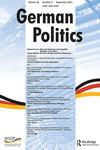Game-Changers for Gender Equality in Germany’s Labour Market? Corporate Board Quotas, Pay Transparency and Temporary Part-Time Work
IF 2.1
3区 社会学
Q2 POLITICAL SCIENCE
引用次数: 8
Abstract
With a women’s employment rate of 76.6 per cent, Germany now ranks among the top EU countries regarding equal labour market participation. However, substantial differences in the employment patterns of women and men persist in the form of ‘typical’ women’s and men’s jobs, women’s underrepresentation in higher management, a high women’s part-time rate and a considerable gender pay gap. Since 2005, four CDU-led governments have adopted various labour laws, with the most recent of these potentially transforming gendered inequalities. The 2016 corporate board quota law addressed vertical segregation, the 2017 pay transparency act is seen as a means of tackling the enormous gender pay gap and the legal entitlement to temporary part-time work, which came into force in 2019, may tackle the so-called ‘part-time trap’ many women fall victim to. The article examines the implementation impact of the latest labour market reforms and discusses the ways in which they are potential game-changers in transforming the German gendered labour market.德国劳动力市场性别平等的变革者?公司董事会配额、薪酬透明度和临时兼职工作
德国妇女就业率为76.6%,目前在平等参与劳动力市场方面位居欧盟前列。然而,男女就业模式的巨大差异仍然存在,表现为“典型”的男女工作、女性在高级管理层中的代表性不足、女性兼职率高以及性别薪酬差距大。自2005年以来,四个基民盟领导的政府通过了各种劳工法,其中最新的一项可能会改变性别不平等。2016年的《公司董事会配额法》解决了纵向隔离问题,2017年的《薪酬透明度法》被视为解决巨大的性别薪酬差距的一种手段,2019年生效的临时兼职法律权利可能会解决许多女性成为受害者的所谓“兼职陷阱”。本文考察了最新劳动力市场改革的实施影响,并讨论了这些改革在改变德国性别劳动力市场方面可能改变游戏规则的方式。
本文章由计算机程序翻译,如有差异,请以英文原文为准。
求助全文
约1分钟内获得全文
求助全文

 求助内容:
求助内容: 应助结果提醒方式:
应助结果提醒方式:


